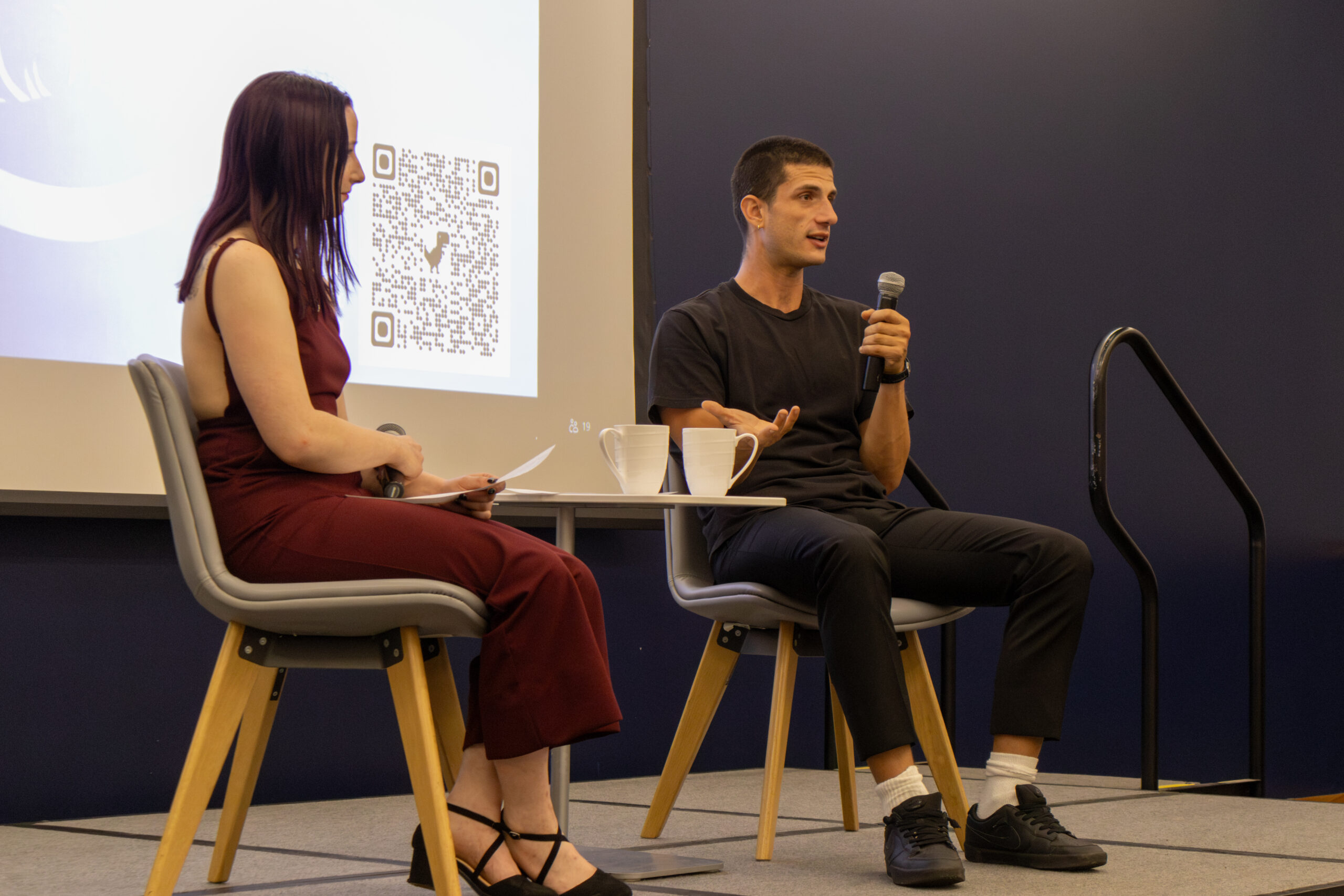Jack Schlossberg, political journalist and grandson of former U.S. President John F. Kennedy, joined Georgetown University College Democrats (GUCD) on Sept. 8 to highlight the role of social media in modern politics.
With approximately 300 students waitlisted for the event, 135 attendees, and many more watching a livestream on Zoom, Georgetown students were eager to hear Schlossberg’s thoughts on political engagement through social media in the country’s current political climate.
Interviewing Schlossberg was GUCD’s Director of Speakers Roan Bedoian (CAS ’28), who opened the discussion by introducing Schlossberg and quickly highlighting his new YouTube show “Test Drive,” which brings his perspective as a younger politician on current political events.
Bedoian dove straight into the conversation, inquiring about Schlossberg’s perspective on current social media use in politics. He emphasised the importance of civil activists, referencing his family’s political legacy to highlight the need for speaking up.
“There’s real consequences from [speaking up],” Schlossberg said. “But there’s also huge opportunities.”
During the talk, Schlossberg encouraged Georgetown students to spark discussion. He discussed improvements made by society on spreading information online and to advocate for their perspectives.
In relation to the country’s current political climate, Schlossberg roused students to challenge the inactivity of elected officials by putting pressure on them online. In discussions surrounding social media activity, Schlossberg asserted the importance of appealing to the demographic by suggesting students to “start playing different and be creative.”
Schlossberg explained how he uses social media as a means of raising awareness regarding U.S. politics. Between his thoughts on making policies on governmental processes more transparent, Schlossberg briefly touched on the use of social media to further his advocacy.
Using positivity as a force on social media, rather than continuing the constant negativity, is a road-less-travelled in Schlossberg’s eyes, and one he believes can help the Democratic Party in future campaigns.
Schlossberg explained how parts of his videos have gone viral after being taken out of context, but expressed confusion when others who are expressing more controversial views online are not getting any pushback.
Schlossberg then discussed the complexity of the algorithm and importance of playing strategically in succeeding online, including that “a little bit of truth” in an otherwise comedic post leads to “the numbers feed[ing] for themselves.”
Schlossberg also began to discuss the disconnect between generations on social media, explaining how older generations may believe the algorithm to be highly organic opposed to personalized.
“A lot of older people don’t know that that’s how [the algorithm] all works,” Schlossberg said.” And that’s the reason that we’re in this [intergenerational divide].”
Given that Schlossberg’s social media content appeals primarily to younger generations, students were curious about his views on possible intergenerational collaboration within the Democratic Party.
Schlossberg responded emphasizing the importance of trying to bridge these gaps, highlighting intergenerational connection through political participation. He expresses that these gaps might irritate younger generations, but believes that it is important to focus on collaboration rather than any frustration.
“I think sometimes we get angry, but sometimes they just don’t get it,” Schlossberg said.“They don’t understand how extreme things are, and I think that it’s on us not to get mad, but to try to explain and say that we also care about what’s going on.”
Some attendees wanted insight into the political writer’s thoughts on possible change in the Democratic Party. In his response, Schlossberg expressed the importance of staying hopeful and engaging, rather than focusing on the repercussions for the Democratic Party following their loss in the 2024 U.S. Election.
“[The consequences of the election are] gonna take a pretty long time to undo, but I think a lot of these [consequences] have been said, so you can’t be in a bad mood about it,” Schlossberg said. “I’m fun, and I’ve been [creating engagement] for a long time.”
Regarding his career, Schlossberg hinted at a possible congressional campaign launch for New York’s 12th Congressional District. Having been asked about this potential run following Representative Jerrold Nadler’s (D-NY) retirement announcement on Sept. 1, Schlossberg suggested that a related announcement will be released soon.
“It’s not something that I ever planned on doing, but I am seriously thinking about it and I will be making an announcement in a very short period of time,” Schlossberg said.
Schlossberg asserts that youth engagement at the forefront of politics is still imperative, especially at a time when political officials are largely older. In order to explain the workings of Congress to answer the student’s question, Schlossberg elaborated on the shift of American politics towards older generations in positions of authority.
“A lot of times people who have power are older and they have it out of seniority. A lot of the times in our history, the average age [of politicians] was younger,” Schlossberg said. “This is sort of a new phenomenon, or at least it’s got a trend, and I think that the answer is for young people to stand up and do something themselves.”






